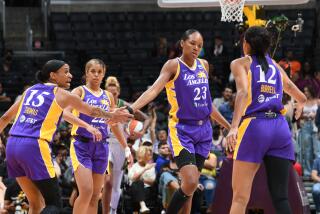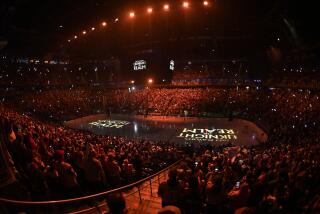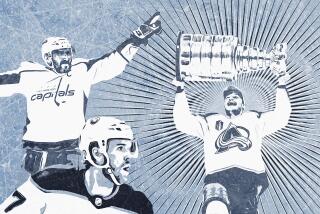Tough Hide Served Buffalo Well
BUFFALO, N.Y. — The NHL’s regular-season Cinderella has more use for snowshoes than for glass slippers, loves a good brawl and keeps an eye out for falling scoreboards.
The Buffalo Sabres were among the biggest surprises in the NHL, combining toughness, defensive diligence and great goaltending in much the same way the Florida Panthers did in reaching the Stanley Cup finals a year ago. “You know in the summer, when you’re sitting on your deck and there are flies buzzing around your head all the time and bugging you, that’s us,” veteran defenseman Garry Galley said. “We’re a gnatty little team.”
Persistence has helped carry the Sabres along a treacherous road to respectability this season.
Last season, under first-year Coach Ted Nolan, the Sabres finished 11th in the Eastern Conference with a 33-42-7 record, 15 points out of the final playoff berth. Run on a relatively small budget before they moved into the new Marine Midland Arena, they made few moves last summer. Their basic strategy was to pray center Pat LaFontaine could produce another 91-point season, right wing Donald Audette’s often-injured knees would hold up and that goalie Dominik Hasek, rail-thin under the best circumstances, wouldn’t melt away altogether under the stress of another 2,000-shot season.
“We knew we’d have a battle with three, four or five teams for the seventh or eighth spot, and that was our focus,” Nolan said. “And that was with Pat LaFontaine. That wasn’t after we lost Pat [to a severe concussion] and then said, ‘Let’s try and battle here.’ All those objectives were with Pat in our lineup and Dominik having a good year.”
They started slowly, getting shut out four times in their first 13 games. Their prospects dimmed further on Nov. 7 when LaFontaine, a two-time 100-point scorer and their only sniper, was forced out of the lineup because of his head injury. The already icy relationship between Nolan and General Manager John Muckler grew frostier as the budget-conscious Muckler made no moves to fortify the offense, and on Nov. 16, the $4-million scoreboard in their glitzy new arena crashed to the ice.
The Sabres’ season could have fallen apart too. After all, the Panthers didn’t have to dodge anything more perilous last season than plastic rats.
“What was the feeling? A lot of panic,” right wing Matthew Barnaby said. “You lose a guy like Pat LaFontaine, a marquee player, a great guy off the ice, our leader, our captain, it’s tough. On the other hand, we all rallied and took the attitude that if we can work hard every night and Dominik could give stellar performances every night, we’re going to have a chance.”
Instead of destroying them, adversity united them. Despite losing LaFontaine--who is practicing but wasn’t cleared to play--and despite the worst power play in the NHL, the Sabres scrapped their way past the high-octane, high-salaried Pittsburgh Penguins to finish first in the Northeast Division, their first division title since 1981. That earned them the second seeding in the East and a first-round playoff matchup against the Ottawa Senators, beginning tonight in Buffalo.
No one is more surprised than Hasek, the Czech native who couldn’t beat out Ed Belfour for the starting job in Chicago but has compiled the best save percentage in the NHL the last four seasons and this season ranked fourth in goals-against average at 2.27.
“My expectations were not very high at all,” said Hasek, whose superb season may make him the first goalie to win the NHL’s most-valuable-player award since Montreal’s Jacques Plante in 1962.
“My goal before the season was to make the playoffs. We were 15 points behind the playoffs last season, and I didn’t even think we could make it. . . . I don’t know what is the reason for this, but we look like a different team.”
The Sabres’ 19-point turnaround isn’t as dramatic as the Dallas Stars’ 38-point gain, but it’s equally impressive because the Sabres have less offensive talent and less experience. The Sabres are tough--they averaged 22.4 penalty minutes a game, second in the NHL--quick and relentless, and when all else fails, Hasek is there to back them up.
They have no one in the top 25 scorers, but neither did last season’s Panthers. “I think we have the best third-line team in the league. We have the best third-line players in the league. Everyone does a great job and comes to work every night and cares for each other,” Barnaby said. “We get a lot of determination from the Panthers, even though we’re a younger team. A lot of people say we aren’t talented but there’s a lot of talented kids in here. Maybe we just needed an extra year to grow.”
That year benefited center Michael Peca, a previously obscure forward obtained from Vancouver in the Alexander Mogilny trade. Peca developed into an excellent penalty killer whose 20 goals include a league-leading six short-handed goals. Center Brian Holzinger also thrived with more playing time, increasing his scoring from 10 goals in 58 games last season to 22 this season, and former King Alex Zhitnik improved his plus/minus rating from minus 25 to plus 10.
“Dominik has been a big part of the team, but you have to give credit to the other guys who stepped up, the young guys 21 and 22 years old,” Zhitnik said. “It’s very difficult in the NHL to be a leader, but they’ve all tried to do that.”
Said Derek Plante, who led the Sabres with 27 goals and 53 points: “Every night you don’t know which line can be our scoring line. What happens is teams get frustrated a little bit by our speed and get frustrated by Dom, so they feel helpless sometimes. We just keep skating on them.”
Until Hasek broke a rib in mid-March, the Sabres hadn’t lost more than two games in a row. While he was out, they were 1-5.
“He’s not your typical superstar,” Nolan said. “He’s out there all the time, working to be better. He refuses to let anybody score on him. When they do, he looks at how they scored and how he can keep them from scoring again.
“We make mistakes, like everybody else does, and some of our younger people make mistakes, like the young guys on other teams. But one key point we have is that when we make a key defensive error, Dominik comes up with a big save. We’re better at making corrections on a semi-positive note, versus [the puck] being in the net and costing us a goal and maybe costing us a game.”
Players agree that LaFontaine’s injury could have cost them the season, but they wouldn’t use his absence as an excuse to give up.
“When Pat went down we said, ‘We’ve just got to pick up our socks here. We’re at home, in a new building, and we’ve got to be accountable,’ ” Galley said. “Then Teddy came out and said, ‘Guys, I’ve got to be more accountable,’ and the great thing about that was nobody hit the panic button. [Muckler] was great too. Those guys were in the boat with us. They weren’t on the outside saying, ‘What’s wrong with you guys?’ They got into the sinking boat with us. They said, ‘We’re in this together. We’re a family.’
“It really did turn at that point. Everyone started to think, ‘We’re a good team when we work hard,’ and we have to work hard because we didn’t have Patty, but we knew Dom was going to keep us in most games. . . . He enabled us to be in games early that we had no business being in and built the confidence that we could win every game.”
Their confidence was tested in the last month, when Barnaby suffered a knee injury and their offense sputtered. But the fundamentals that brought them to this point are in place--Hasek’s goaltending and a pugnacious attitude. And Muckler’s acquisition of winger Miroslav Satan (eight goals in 12 games) for two minor leaguers has added an offensive spark.
“We were a young club trying to get our bearings and place in this league and all of a sudden we’re playing a lot of close games early,” Nolan said. “We like to grind and we never quit, and we’ve got great goaltending.”
The biggest question for Hasek is his teammates’ poise under playoff pressure. “For this team, the problem is we don’t have too much experience in the playoffs,” Hasek said, “but if you play well in the regular season you’re supposed to play well in the playoffs.
“I don’t think we’re ready to win the Stanley Cup, but we’re ready to go far.”
More to Read
Go beyond the scoreboard
Get the latest on L.A.'s teams in the daily Sports Report newsletter.
You may occasionally receive promotional content from the Los Angeles Times.







